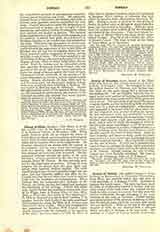

Conrad of Saxony (also called CONRADUS SAXO, CONRAD OF BRUNSWICK, or CONRADUS HOLYINGER), Friar Minor and ascetical writer, date and place of birth uncertain; d. at Bologna in 1279. Holyinger is perhaps his family name. The error has been made by some of confounding Conrad of Saxony with another person of the same name who suffered for the Faith in 1284, whereas it is certain that they were two distinct individuals, though belonging to the same province of the order in Germany. Conrad became provincial minister of the province of Saxony in 1245, and for sixteen years ruled the province with, much zeal and prudence. While on his way to the general chapter of 1279, he was attacked with a grievous illness and died at Bologna in the same year. The writings of Conrad of Saxony include several sermons and the “Speculum Beatae Marko Virginis”; the latter, at times erroneously attributed to St. Bona-venture, has recently been edited by the Friars Minor at Quaracchi. The preface to this excellent edition of the “Speculum” contains a brief sketch of the life of Conrad of Saxony and a critical estimate of his other writings.
STEPHEN M. DONOVAN

